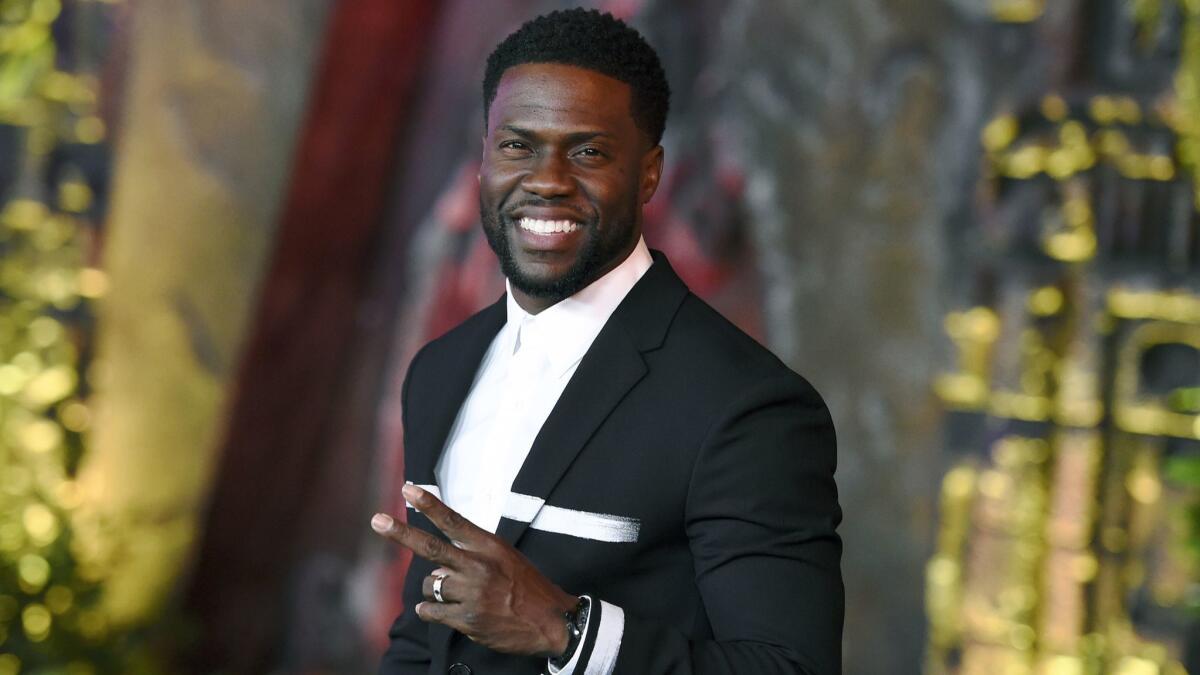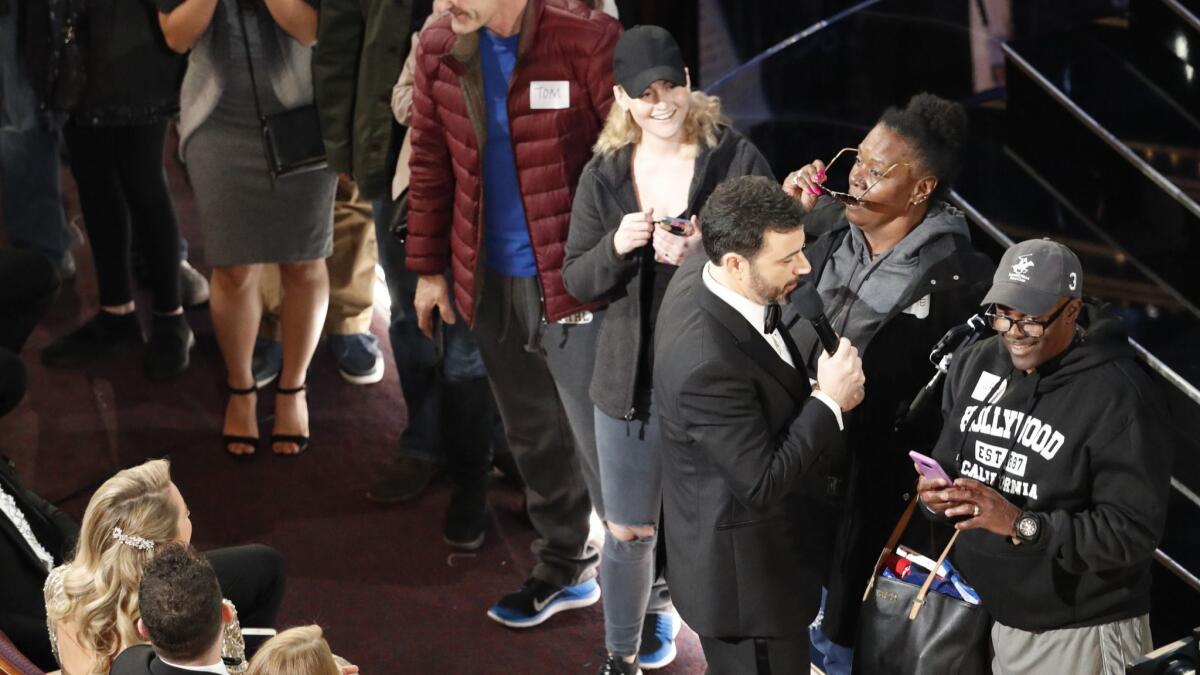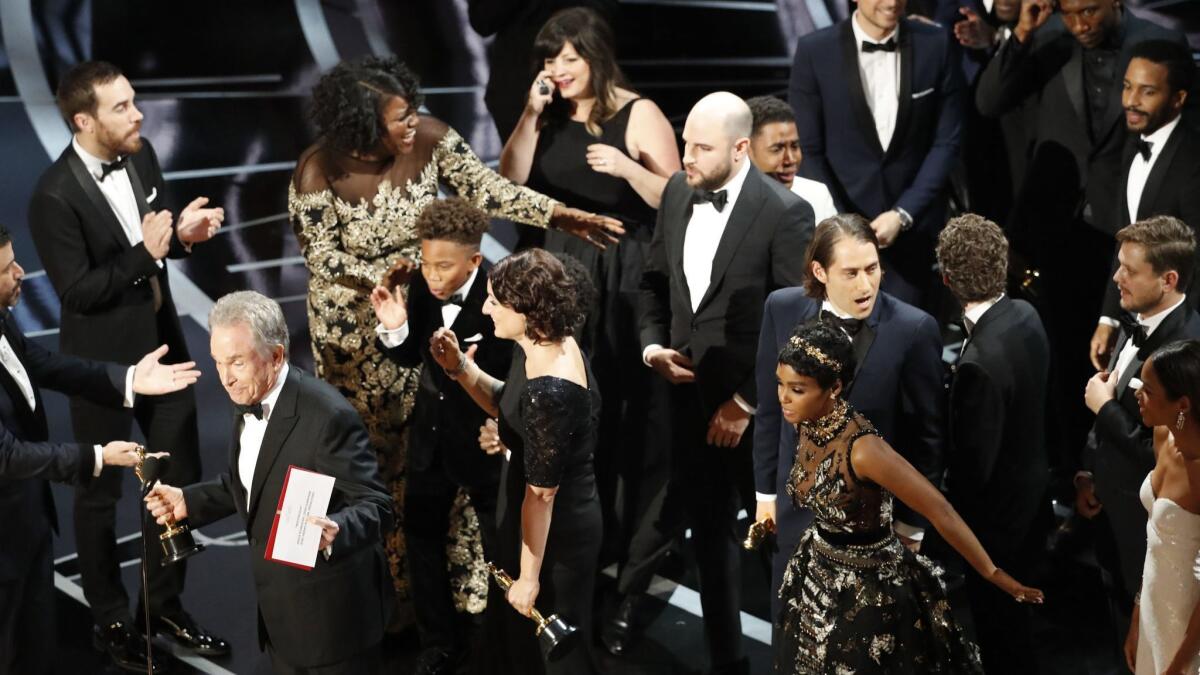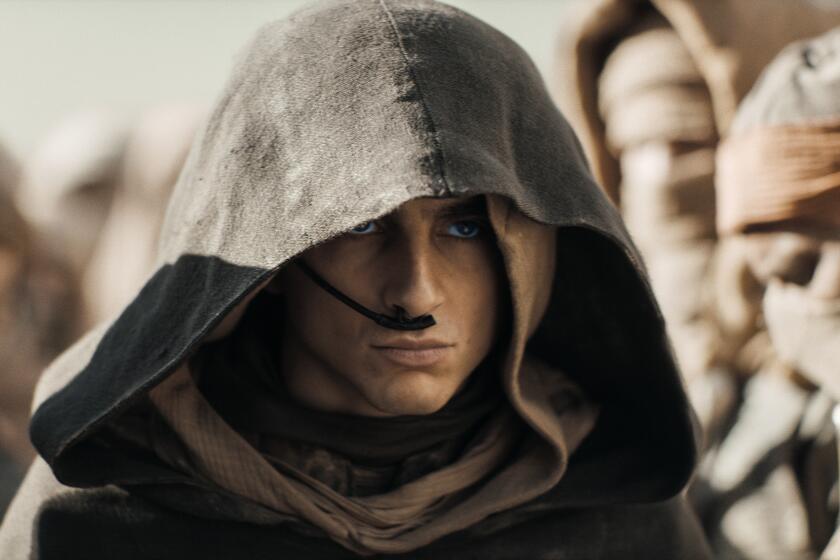The Kevin Hart Oscars imbroglio represents the latest in a string of crises for the motion picture academy

On Tuesday afternoon, the Academy of Motion Picture Arts and Sciences brought together members of the press and a handful of film industry power players for a luncheon to celebrate a happy occasion: the unveiling of the exhibitions that its long-awaited museum will feature when it opens late next year.
“It’s a dream come true, the Academy Museum,” academy Chief Executive Dawn Hudson said with a smile as the crowd tucked into plates of branzino and roasted potatoes on the penthouse floor of the Petersen Automotive Museum, across the street from the future Academy Museum of Motion Pictures. “So join me in a sigh of relief.”
That sense of relief wouldn’t last long.
Later on Tuesday, comedian Kevin Hart announced that he would be hosting the 2019 Oscars — and within 48 hours, that announcement had exploded in the academy’s face as Hart drew widespread criticism for a number of old tweets and jokes that expressed homophobic sentiments.
Commentary: Kevin Hart is out as Oscars host. And there are plenty of worthy replacements »
After deleting a number of offensive tweets, Hart at first pushed back against the rapidly growing outcry, defiantly vowing on his Instagram account that he was “not going to let the craziness frustrate me or anger me.”
But for an academy that has worked hard in recent years to diversify its ranks and last year adopted a new code of ethical conduct for its members, being associated with such expressions of intolerance was clearly untenable. The academy urged Hart to issue an apology. He initially declined, explaining in an Instagram video, “I’ve addressed this several times.” But by late Thursday he had stepped down from the hosting gig that he had regarded as a lifelong dream.
“I do not want to be a distraction on a night that should be celebrated by so many amazing talented artists,” Hart wrote on Twitter. “I sincerely apologize to the LGBTQ community for my insensitive words from my past.”
For Hart, who has starred in box office hits like “Jumanji: Welcome to the Jungle” and “Central Intelligence,” the episode is certain to carry its own sting. But for the academy, it highlights the increasing challenge, in this age of intense social media scrutiny and instant viral controversies, of finding a host who has a completely unblemished public record.
“While now it seems reasonable and appropriate to ‘vet’ the host, I don’t think that was ever a consideration in the past,” said producer and former studio executive Bill Mechanic, who produced the Oscars telecast with Adam Shankman in 2010. “I know it wasn’t the year I produced. Certainly things have changed and after this year it will have to be done.”
According to a person familiar with the process but not authorized to speak publicly, Hart had been on a list of potential hosts that ABC, which airs the Oscars, had approved, but selecting him was ultimately the academy’s decision. Two other stars ahead of Hart on the list, including Dwayne Johnson, were interested but not available due to movie production commitments. Hart was willing and available.

Jimmy Kimmel, who hosted the past two years, did not want to do it again, according to this source, in part because he was told the academy did not think the everyman-type comedy he did on the show — including surprising people at a nearby movie theater by showing up with Gal Gadot, Mark Hamill and other stars and handing out snacks — was prestigious enough for the broadcast.
The academy did not respond to a request for comment.
The Hart flap caps a tumultuous period for the academy in which the group — already trying to recover from the #OscarsSoWhite firestorm and the bungled announcement at the 2017 telecast of the wrong best picture winner — has weathered one crisis after another.
In March, shortly after the academy ejected disgraced film mogul Harvey Weinstein from its ranks, the group’s new president, John Bailey, was himself investigated for sexual harassment allegations, of which he was ultimately cleared. In September, the academy said it was shelving a proposed new Oscar for outstanding achievement in popular film less than a month after it was announced, following widespread criticism that it represented a blatant act of pandering. And just this week, the academy revealed that it was once again pushing back opening its long-overdue museum, which has been beset by delays and cost overruns, to late 2019.
Beyond these headaches, the academy faces a deeper existential dilemma. Ratings for the all-important Oscars telecast, from which the group draws the bulk of its revenue — $122.9 million for fiscal year 2016-17, according to the group’s most recent annual report — have been steadily declining. March’s telecast reached an all-time low audience of 26.5 million viewers.

In tapping Hart, who boasts an enormous social media following and a large base of young fans, the academy had been hoping to reverse that slide. With the show slated for Feb. 24, the academy and this year’s telecast’s producers, Donna Gigliotti and Glenn Weiss, must now go back to the drawing board to find a new emcee.
Despite the glittering prestige associated with the Academy Awards, hosting the Oscars is widely regarded as one of the most difficult — and often thankless — gigs in Hollywood.
“Ugh, who wants that job?” actor Jack Black told The Times in 2015. “If you [blow it], everyone hates you. If you crush it, then you could someday, what, become the host of a TV show or something? I don’t know what it’s for. It’s so stressful.”
The academy faced a similar crisis in 2011 when its planned producer for the telecast, Brett Ratner, dropped out after being blasted for commenting that “rehearsal is for fags.” Ratner’s chosen host, Eddie Murphy, also stepped down and was ultimately replaced by veteran emcee Billy Crystal for his ninth stint.
“No other awards show faces the scrutiny of the Oscars — that’s good in that people care but bad in most other ways,” said Mechanic, who resigned from the academy’s board of governors earlier this year, issuing a stinging letter in which he criticized what he saw as poor leadership. “One of the biggest problems is it’s damn near impossible to find the ‘right’ host. There’s no getting it right. People you want won’t even take your phone call. The late-night hosts tend to work off topical political humor and have very little movie roots. Our biggest stars most often are no’s from the get-go.”
Further complicating the search for a host, the public microscope on statements and social media postings of Hollywood luminaries has only intensified. This summer, Walt Disney Studios fired James Gunn as director of the hugely successful “Guardians of the Galaxy” franchise after old tweets were unearthed in which he joked darkly about such sensitive topics as pedophilia and rape.
“No other awards show faces the scrutiny of the Oscars — that’s good in that people care but bad in most other ways.”
— Bill Mechanic, film producer
Despite the challenges, there is little doubt that the academy — which has in the past announced hosts as late as January — will find a new emcee for this year’s Oscars, possibly sooner than later. For all its attendant perils, hosting the Academy Awards still gives a performer a massive platform — and with the emcee typically requiring four weeks of preparation and rehearsal to get ready for the show, the academy still has some time, though not much.
Still, coming so closely on the heels of the fizzled most popular Oscar gambit, the Hart imbroglio is likely to continue to fuel questions about what many see as a lack of direction and clarity of vision for the film industry’s leading organization.
Speaking to The Times last year, Hudson acknowledged that her leadership has been polarizing at times. But she insisted that just goes with the territory when one is trying to steer a 91-year-old, tradition-bound institution through a period of transition and unprecedented challenges.
“There’s an idea of change and then there’s actually going through change — and sometimes it’s harder to go through it,” Hudson said. “That’s human. … It can feel a little scary. But I think overall, people see the strides we’ve made.”
In the wake of the Hart flap, academy members reached by the Times on Friday were bemoaning what they saw as the group’s latest black eye and questioning who deserved the blame for it — mentioning Hudson, Bailey and Gigliotti — beyond Hart’s own actions. One member was offended by Hart’s tweets, while others still hadn’t read them. But all agreed that hiring a host — particularly a comedian — is only going to get more difficult going forward.
“They should consider just not having a host, like they have many times in the past,” said one member, who declined to speak on the record given the sensitivity of the subject. “Why not try it? They’d skirt all these issues and save themselves all the grief and risk of controversy. Just do a bunch of introductions and call it a day.”
Times staff writers Stephen Battaglio and Glenn Whipp contributed to this report.
Twitter: @joshrottenberg
More to Read
Only good movies
Get the Indie Focus newsletter, Mark Olsen's weekly guide to the world of cinema.
You may occasionally receive promotional content from the Los Angeles Times.











